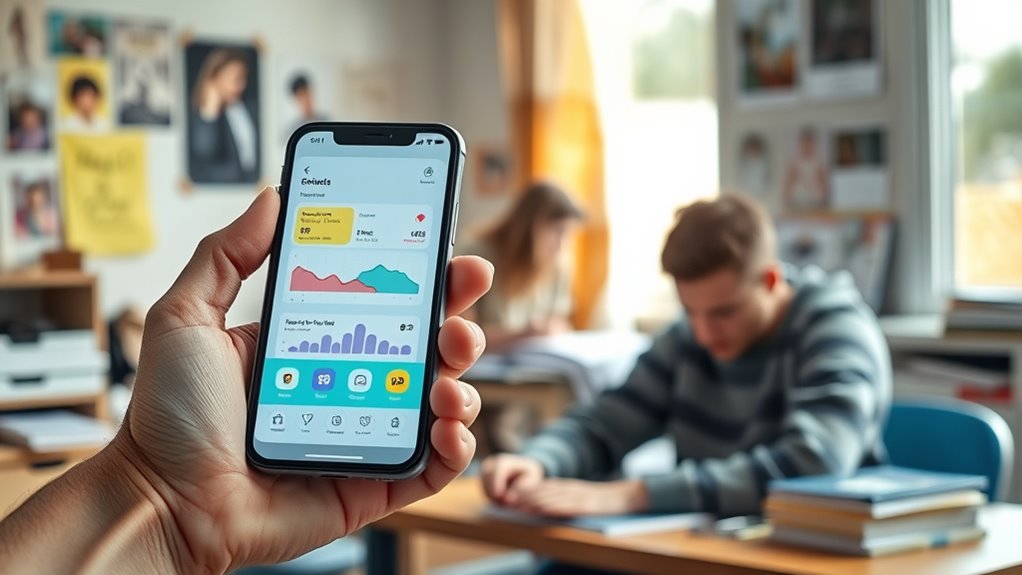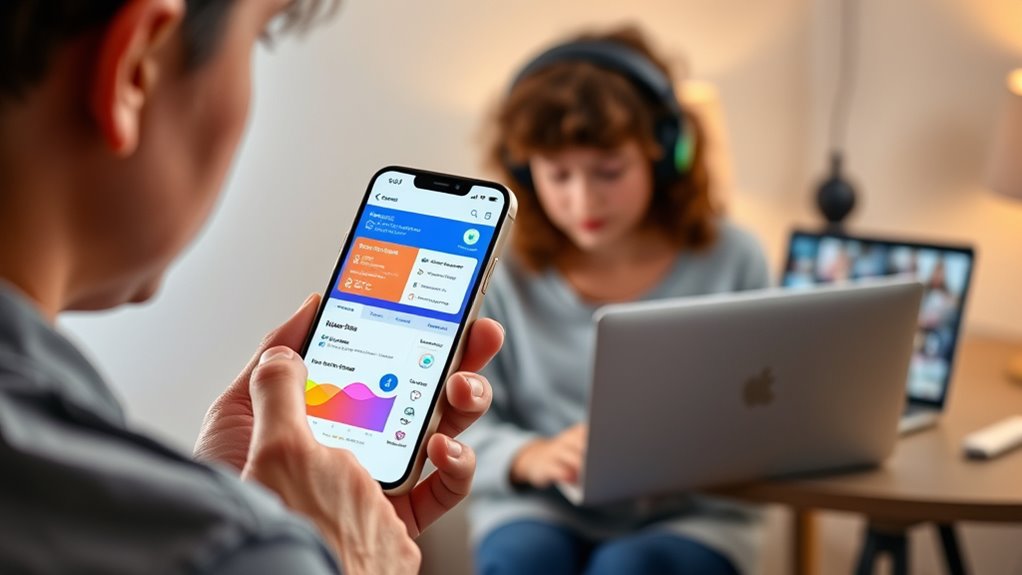An AI app now helps you monitor your child’s social media for early signs of depression, focusing on language, tone, and activity patterns instead of invasive message scanning. It alerts you to concerning behaviors early, so you can take supportive action before issues escalate. The app balances safety and privacy by not constantly monitoring messages and encourages open communication. To discover how this technology can support your family, explore more details below.
Key Takeaways
- The app analyzes language and activity patterns on social media to detect early signs of depression and mental health issues.
- It alerts parents proactively, enabling timely support without invasive message scanning.
- Privacy is prioritized by focusing on overall behavior trends rather than monitoring individual messages.
- The tool complements open communication, fostering trust and understanding between parents and teens.
- Data security and transparency are essential to ensure responsible use and protect teens’ sensitive information.

As concerns about teen mental health grow, a new AI-powered app is gaining attention for its ability to monitor kids’ social media activity and alert parents to potential signs of depression. This innovative technology aims to give parents early warnings, potentially saving lives by catching warning signs before they escalate. However, it also raises important questions about social media privacy and how much monitoring is appropriate when it comes to teens’ online lives. You might wonder whether such an app invades your child’s privacy or if it’s a necessary tool to protect their mental well-being.
Emerging AI tools monitor teen social media for early mental health warning signs, balancing safety and privacy concerns.
Teen mental health has become a significant concern in recent years, with studies linking social media use to increased risks of anxiety, depression, and even suicidal thoughts. While social media offers a platform for connection and self-expression, it can also expose teens to cyberbullying, harmful content, and unrealistic social comparisons. As a parent, you want to support your child’s mental health without crossing boundaries or violating their privacy. The key is finding a balance—using technology to help without making your teen feel surveilled or mistrusted. This app attempts to do just that by focusing on detecting warning signs based on language, tone, and activity patterns, rather than invasive monitoring of every message.
Despite its potential benefits, social media privacy remains a concern. You may worry about how data is collected, stored, and who has access to it. It’s essential that apps like this prioritize user privacy, ensuring that sensitive information isn’t misused or shared without consent. Transparency about what data is analyzed and how alerts are generated can help build trust. Furthermore, involving your teen in discussions about monitoring is essential; transparency fosters cooperation and helps them understand that the goal is their safety, not restriction or control.
Using an AI app to monitor social media doesn’t mean you’re replacing open communication with your teen. It’s a tool to complement your efforts in supporting their mental health. You should still encourage honest conversations, create a safe space for sharing feelings, and educate them about mental health issues. The app serves as an additional layer of support—alerting you early if concerning behaviors emerge—while you continue to foster trust and understanding. Additionally, understanding the underlying personality traits that influence how teens express themselves online can help you interpret their behaviors more effectively and tailor your support accordingly.
In the end, embracing technology like this can be a helpful part of your parenting toolkit, but it’s essential to balance safety with respect for your teen’s social media privacy. When used thoughtfully, such apps can help you stay informed and proactive, giving your teen the support they need during challenging times while respecting their independence and privacy.
Frequently Asked Questions
How Is Kids’ Privacy Protected During Social Media Scans?
You’re right to ask about privacy. During social media scans, the app follows strict data privacy measures and consent protocols to protect kids’ information. You’re usually asked for your permission before any data is collected, and the app only analyzes publicly available content. Plus, data is anonymized and encrypted, ensuring sensitive details stay secure. This way, kids’ privacy remains protected while helping parents stay informed.
Can the App Detect Other Mental Health Issues Besides Depression?
Yes, the app can detect other mental health issues like anxiety and self-harm tendencies through mental health screening. It analyzes social media activity for warning signs, helping you spot early problems. However, privacy concerns are valid; the app aims to protect your child’s data by following strict privacy policies and using anonymized data. Always stay involved and discuss any findings with a mental health professional for thorough support.
What Age Range Is Suitable for Using This App?
You should consider this app for children aged 10 to 17, ensuring you prioritize child safety and digital literacy. At this age, kids begin exploring social media more independently, so it’s crucial to guide them and set boundaries. The app helps you monitor signs of depression while teaching your child about responsible online behavior, fostering trust, and promoting awareness of mental health. Always supervise their digital activities to keep them safe.
How Accurate Are the Depression Risk Predictions?
You’ll find that the algorithm accuracy varies, but it’s generally quite reliable in detecting depression signs. However, false positives can occur, meaning the app might flag some kids who aren’t actually at risk. While it’s a helpful tool, it shouldn’t substitute professional assessments. Always combine app insights with input from mental health experts to ensure accurate understanding and appropriate support for your child’s mental health.
Is Parental Consent Required Before Monitoring Social Media?
Yes, parental consent is generally required before monitoring your child’s social media, considering legal implications and ethical considerations. Laws like COPPA and GDPR aim to protect minors’ privacy, so you should guarantee you’re compliant. Ethically, obtaining consent respects your child’s rights and fosters trust. Always stay informed about local regulations and discuss monitoring openly with your child to balance safety with privacy rights.
Conclusion
As you watch over your child’s digital world, this new tool acts like a gentle lighthouse, guiding you through unseen waters. It softly highlights signs that might suggest they’re steering through rough seas of emotion. While it doesn’t replace your intuition, it offers a clearer view of their inner landscape. With this aid, you can better steer them toward calmer waters, ensuring they feel supported, understood, and safe as they journey through their unique emotional voyage.










